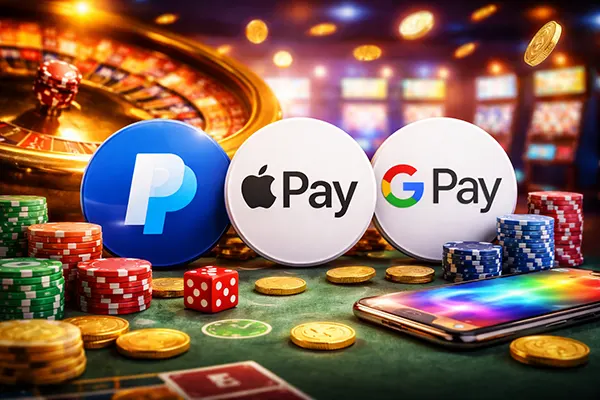
Payment Methods and Withdrawals in 2025: Trends Among Online Casino Players
The financial behaviour of online casino players in 2025 is undergoing a noticeable transformation. As digital technologies evolve and regulations tighten across various regions, players are choosing more secure, fast, and anonymous methods of managing their funds. The shift is especially prominent among users who prioritise transaction speed, transparency, and compatibility with mobile devices.
Most Popular Deposit Methods Among Online Casino Players
Credit and debit cards remain popular, but their dominance is fading due to increasing demand for faster and safer alternatives. Visa and Mastercard are still commonly used in regions with stable banking systems, but players are turning to newer options that offer added privacy and lower fees. These include digital wallets and instant bank transfer systems that provide almost immediate confirmation of deposits.
One of the most significant trends in 2025 is the rise of mobile payment systems such as Apple Pay, Google Pay, and Samsung Pay. These platforms integrate seamlessly with smartphones, allowing users to authorise transactions quickly using biometric authentication. Their widespread acceptance and added security features make them a preferred choice, especially in mobile-first markets like Scandinavia and parts of Asia.
Prepaid vouchers such as Paysafecard and Neosurf continue to attract users who prefer not to share their banking details online. These systems are valued for their ease of access, availability in local retail stores, and budget control benefits. They are particularly appealing to new users entering the online gambling market for the first time.
Cryptocurrency as a Deposit Tool
Cryptocurrency deposits have seen notable growth in 2025, especially among experienced users. Bitcoin, Ethereum, and stablecoins like USDT are being used more frequently thanks to their anonymity and decentralised nature. Blockchain-based transactions are also appreciated for their transparency and fixed transaction fees.
Despite the volatility of some cryptocurrencies, their use is growing due to reduced banking restrictions and acceptance by leading online casinos. Platforms supporting crypto payments typically offer faster processing times and bonuses tailored to crypto users, making them increasingly attractive.
Security improvements and third-party wallet integrations have also encouraged adoption. Players are now able to deposit directly from cold wallets, reducing exposure to potential online threats while maintaining control over their funds.
Withdrawal Preferences in 2025
Speed remains the top priority for withdrawals. E-wallets such as Skrill, Neteller, and PayPal dominate this category, providing same-day or even instant access to funds. These systems have built reputations for reliability and efficiency, making them ideal for players who demand quick returns without the delays of traditional banking methods.
Bank transfers, while slower, are still widely used for higher-value withdrawals. Many players trust them due to the oversight provided by national financial institutions. Moreover, modernised bank APIs now allow for faster settlement, typically within one to two business days, a major improvement from previous wait times.
Cryptocurrency withdrawals are becoming more mainstream, driven by improvements in blockchain scalability and wallet infrastructure. For high rollers, crypto withdrawals offer both speed and privacy, with the added advantage of avoiding intermediaries and cross-border transaction limitations.
Verification and KYC Compliance
In 2025, withdrawal processes are tightly regulated, especially in licensed jurisdictions such as the EU and UK. Know Your Customer (KYC) procedures remain mandatory, requiring players to verify their identity before accessing winnings. Casinos have streamlined these processes using AI-powered document scanning and instant verification tools.
Players are advised to complete their verification shortly after registration to prevent delays. Trusted operators now clearly communicate these requirements at onboarding, helping reduce friction later during withdrawals.
Some newer casinos also implement reusable digital IDs, allowing players to verify once across multiple brands. This trend not only simplifies compliance but also enhances data security and transparency in the gambling sector.

Trends in Payment Security and User Trust
Security is a central concern in 2025, with more operators employing end-to-end encryption, two-factor authentication, and advanced fraud monitoring tools. Payment providers are collaborating with regulators to maintain high standards of compliance while ensuring user privacy.
Users now expect strong security without sacrificing convenience. Biometric logins, device fingerprinting, and session tracking are standard features across leading gambling platforms. These technologies help detect suspicious behaviour and protect user funds effectively.
Education also plays a role. Online casinos have begun providing clear, user-friendly guides on payment methods and safety tips. These resources improve player confidence and reduce the risk of scams or transaction errors, fostering a safer gambling environment overall.
Mobile-First Experience and Regional Differences
The majority of casino transactions in 2025 occur via mobile devices. This shift has influenced the development of payment interfaces, with providers optimising for one-tap deposits and withdrawals. Mobile wallets and browser-integrated systems dominate this space, particularly in regions where smartphones are the primary mode of internet access.
Regional preferences vary: Scandinavian users favour Trustly and Swish for their real-time banking capabilities, while users in Latin America increasingly adopt Pix and Mercado Pago. Understanding local payment habits is now essential for global casino operators seeking to grow their user base.
Finally, casino platforms are incorporating local currencies and language support in payment systems. This not only improves usability but also ensures compliance with financial regulations in different countries, making transactions smoother and more accessible to players worldwide.





